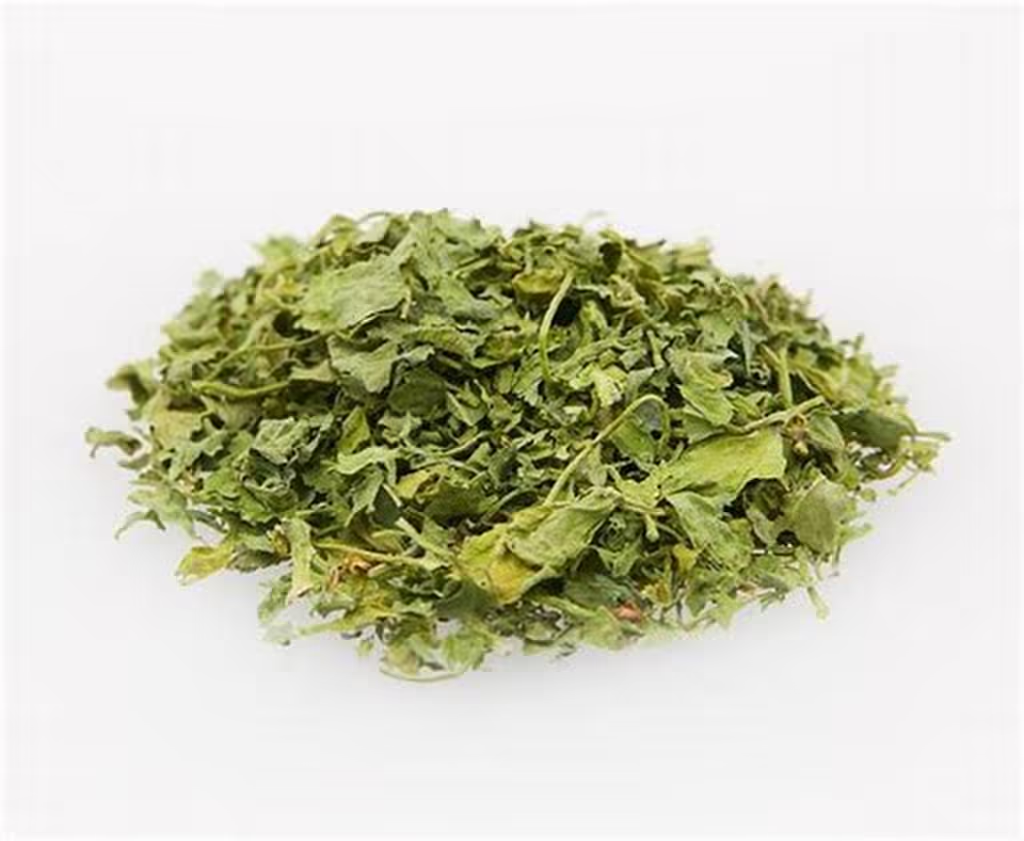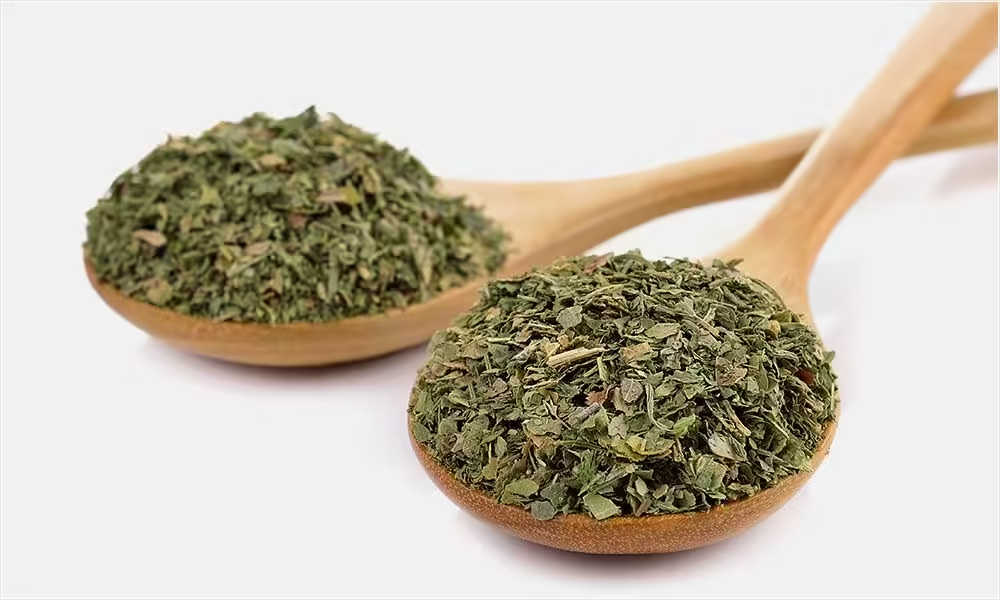Table of Contents
Introduction to Kasuri Methi
Kasuri Methi, also known as dried fenugreek leaves, is a beloved herb in Indian cuisine, imparting a distinctive flavor and aroma to various dishes. Derived from the fenugreek plant, Kasuri Methi is prepared by drying the fresh leaves under the sun. This process enhances its bitter yet aromatic taste, which is cherished in many traditional Indian recipes. The name “Kasuri” refers to the region of Kasur in Punjab, where the best quality methi is said to originate. Kasuri Methi is widely used in curries, dals, parathas, and even in pickles, making it a versatile ingredient in the kitchen.
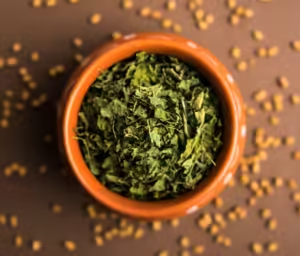
Historical Significance and Origin
The history of Kasuri Methi dates back to ancient times, with its origin rooted in the Indian subcontinent. Fenugreek, the plant from which Kasuri Methi is derived, has been cultivated for thousands of years. It was not only valued for its culinary uses but also for its medicinal properties. Ancient texts from Ayurveda and traditional Chinese medicine mention fenugreek for its healing abilities, particularly in treating digestive disorders, reducing inflammation, and balancing blood sugar levels. The leaves of the fenugreek plant were dried and stored to be used during off-seasons when fresh greens were not available, which led to the creation of Kasuri Methi.
Nutritional Profile of Kasuri Methi
Kasuri Methi is not just a flavor enhancer but also a nutritional powerhouse. It is rich in dietary fiber, protein, and essential vitamins such as Vitamin C, Vitamin K, and several B vitamins. The leaves also contain significant amounts of iron, calcium, and magnesium, making them a valuable addition to a balanced diet. The high fiber content aids in digestion, while the antioxidants present in Kasuri Methi help in combating free radicals, thereby reducing the risk of chronic diseases.
Culinary Uses of Kasuri Methi
Kasuri Methi is a staple in Indian kitchens, known for its ability to elevate the taste of various dishes. Its strong aroma and slightly bitter taste are best suited for rich and creamy gravies, where it adds a layer of complexity. It is commonly used in dishes like Methi Malai Paneer, Butter Chicken, and Aloo Methi. In addition to main courses, Kasuri Methi is also sprinkled over breads like naan and parathas, giving them a distinctive flavor. The herb is also a key ingredient in spice blends like garam masala and panch phoron, further showcasing its versatility.

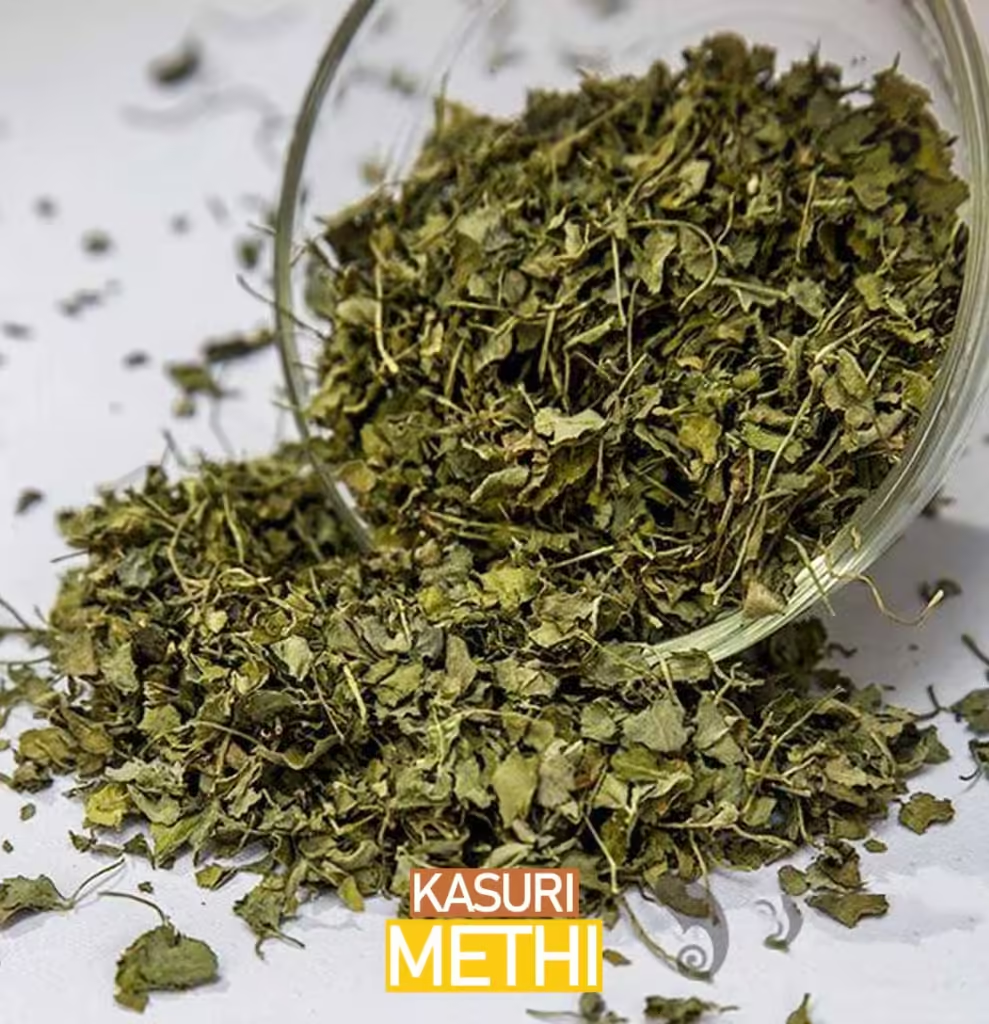
Health Benefits of Kasuri Methi
Kasuri Methi offers a plethora of health benefits, making it a valued herb beyond its culinary uses. One of its most well-known benefits is its ability to aid in digestion. The high fiber content helps in regulating bowel movements, preventing constipation, and promoting a healthy gut. Moreover, Kasuri Methi has been found to have anti-inflammatory properties, which can help in reducing symptoms of arthritis and other inflammatory conditions. It is also beneficial for those with diabetes, as it helps in managing blood sugar levels by improving insulin sensitivity.
Role of Kasuri Methi in Traditional Medicine
In traditional medicine systems like Ayurveda, Kasuri Methi has been used for its medicinal properties for centuries. It is believed to balance the Vata and Kapha doshas, thereby promoting overall well-being. The dried leaves are often used in concoctions to treat respiratory issues, digestive disorders, and skin problems. The cooling properties of Kasuri Methi make it a preferred ingredient in summer drinks and foods, helping to reduce body heat. Its bitter taste is also thought to stimulate appetite and improve digestion, making it a common ingredient in digestive aids and tonics.
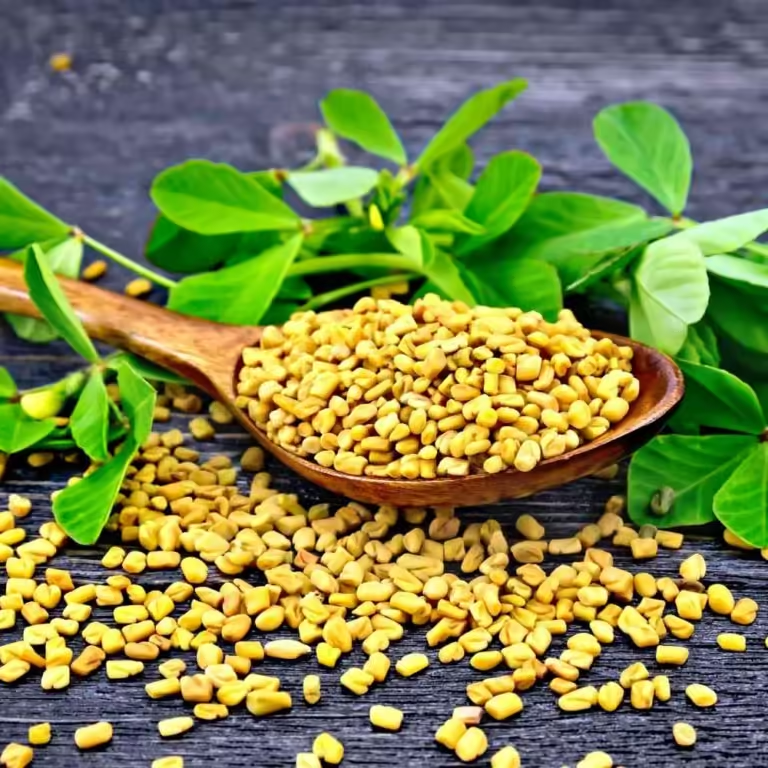
Growing and Harvesting Kasuri Methi
Growing Kasuri Methi at home is relatively easy, as fenugreek is a hardy plant that thrives in various climates. It can be grown in pots or directly in the ground, requiring minimal care. The seeds are sown in well-drained soil and need regular watering to ensure healthy growth. Once the plants reach a height of about 6 inches, the leaves can be harvested. These fresh leaves can be used in cooking or dried to make Kasuri Methi. Drying the leaves is a simple process, involving spreading them out in a single layer under the sun until they become brittle and lose their moisture content.
Cooking with Kasuri Methi: Recipes and Tips
Cooking with Kasuri Methi is an art that requires a balance of flavors. The herb’s strong taste means that it should be used sparingly to avoid overpowering the dish. One of the simplest ways to use Kasuri Methi is to crush the dried leaves between your palms and sprinkle them over curries or dals just before serving. This method releases the herb’s essential oils, enhancing the aroma and taste. For a more intense flavor, Kasuri Methi can be added during the cooking process, especially in creamy gravies and rich sauces. It pairs exceptionally well with dairy-based dishes, as the creaminess of the dish helps to mellow the bitterness of the methi.
Kasuri Methi in Global Cuisine
While Kasuri Methi is primarily associated with Indian cuisine, its unique flavor has found its way into global kitchens as well. Chefs around the world have started experimenting with this herb, incorporating it into dishes that go beyond traditional Indian recipes. It is used in Middle Eastern stews, Mediterranean salads, and even in some Western dishes like casseroles and meat rubs. The herb’s ability to add depth and complexity to dishes makes it a favorite among chefs looking to create fusion cuisine.
Substituting Fresh Methi with Kasuri Methi
In recipes that call for fresh fenugreek leaves, Kasuri Methi can be used as a substitute, though the flavor profile will differ slightly. Since dried herbs are more concentrated, a smaller amount of Kasuri Methi is required compared to fresh leaves. A general rule of thumb is to use one tablespoon of Kasuri Methi for every three tablespoons of fresh fenugreek leaves. To rehydrate the dried leaves, they can be soaked in warm water for a few minutes before adding them to the dish. This method helps in softening the leaves and reducing their bitterness, making them more palatable.
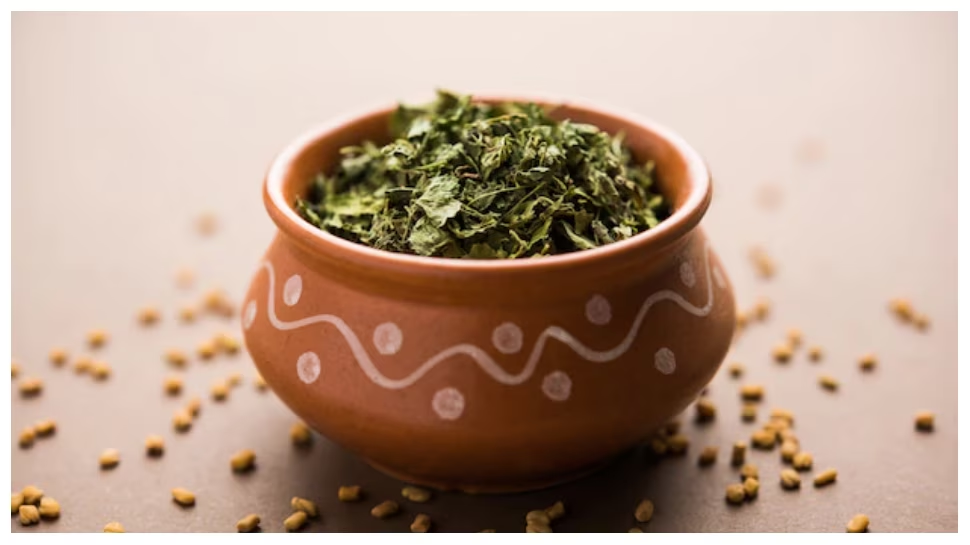
Preserving and Storing Kasuri Methi
Proper storage of Kasuri Methi is essential to retain its flavor and aroma. The dried leaves should be kept in an airtight container, away from direct sunlight and moisture. This helps in preserving the herb’s quality for a longer period. When stored correctly, Kasuri Methi can last for up to a year without losing its potency. It is also advisable to store the herb in small quantities, as frequent exposure to air can cause it to lose its essential oils, resulting in a diminished flavor.
Kasuri Methi in Vegetarian and Vegan Dishes
Kasuri Methi is a versatile ingredient that enhances the taste of vegetarian and vegan dishes. It adds a unique depth of flavor to plant-based curries, lentil soups, and vegetable stir-fries. In vegan cuisine, where umami flavors can sometimes be challenging to achieve, Kasuri Methi plays a crucial role in providing that savory note. It is also used in vegan cheese recipes, where it mimics the slightly tangy taste of dairy. For vegetarians, Kasuri Methi is often paired with paneer (Indian cottage cheese) in dishes like Methi Malai Paneer, where the herb complements the creamy texture of the paneer.
The Environmental Impact of Kasuri Methi Cultivation
The cultivation of Kasuri Methi has a relatively low environmental impact, as fenugreek is a hardy plant that requires minimal resources to grow. It does not need excessive water, making it a sustainable crop in regions with limited rainfall. Additionally, fenugreek plants are known to improve soil health by fixing nitrogen, which enhances soil fertility for subsequent crops. This makes Kasuri Methi cultivation beneficial not only for the farmers but also for the environment. The drying process of the leaves is also energy-efficient, as it relies on natural sunlight rather than artificial methods.
Cultural Significance of Kasuri Methi in Indian Festivals
Kasuri Methi holds a special place in Indian culture, particularly during festivals and celebrations. It is often used in festive dishes like pakoras (fritters), biryanis, and stuffed parathas, where its flavor is associated with warmth and comfort. During the winter months, Kasuri Methi is also added to ladoos (sweet balls) and other traditional sweets, as it is believed to generate heat in the body and keep one warm. The herb’s association with traditional cooking and its use in family recipes passed down through generations make it a cherished ingredient in Indian households.
Kasuri Methi in Pickling and Preserving
In addition to its use in fresh and cooked dishes, Kasuri Methi is also an essential ingredient in pickling and preserving. The dried leaves are often added to pickles, where their robust flavor complements the tangy and spicy notes of the preserved vegetables. Kasuri Methi is also used in chutneys and relishes, where it adds a bitter-sweet element that balances the other flavors. The herb’s natural preservative properties help in extending the shelf life of pickled products, making it a valuable addition to homemade preserves.
Popular Brands and Buying Guide for Kasuri Methi
When purchasing Kasuri Methi, it is important to choose a high-quality product to ensure the best flavor and aroma. Several brands in the market offer Kasuri Methi, each with varying levels of quality. Look for brands that source their methi from the Kasur region, as these are known to produce the best quality leaves. The dried leaves should be green and free from any yellow or brown spots, indicating freshness. It is also advisable to buy Kasuri Methi in small quantities to ensure that it is used while still fresh.
Kasuri Methi in Ayurveda: A Deep Dive
Ayurveda, the ancient Indian system of medicine, considers Kasuri Methi to be a valuable herb with numerous health benefits. According to Ayurvedic principles, Kasuri Methi is believed to balance the Vata and Kapha doshas, making it beneficial for individuals with these imbalances. It is also considered to be a warming herb, which is why it is often used in winter foods to provide warmth and improve digestion. Ayurvedic practitioners also recommend Kasuri Methi for its detoxifying properties, as it helps in cleansing the body of toxins and impurities.
Cooking with Kasuri Methi: A Beginner’s Guide
For those new to cooking with Kasuri Methi, it can be a bit challenging to incorporate this herb without overpowering the dish. A good starting point is to use Kasuri Methi in simple recipes like scrambled eggs, where a small pinch of the herb can transform the flavor profile. Another easy way to use Kasuri Methi is in flatbreads like roti or naan, where the dried leaves can be kneaded into the dough. As one becomes more comfortable with the herb’s flavor, it can be added to more complex dishes like curries and stews, where it shines as a key ingredient.
Exploring the Flavor Profile of Kasuri Methi
The flavor profile of Kasuri Methi is complex, with bitter, nutty, and slightly sweet undertones. This makes it a unique herb that can enhance both savory and sweet dishes. The bitterness of Kasuri Methi is often balanced with the use of dairy, such as cream or yogurt, which helps to mellow the strong flavor. The nutty undertones of the herb are brought out when it is toasted or fried in oil, adding a rich, earthy taste to the dish. The slight sweetness of Kasuri Methi is more subtle but can be noticed in dishes where the herb is used in larger quantities.
The Science Behind Kasuri Methi’s Health Benefits
The health benefits of Kasuri Methi are backed by scientific research, which highlights its nutritional and medicinal properties. The high fiber content in Kasuri Methi aids in digestion and helps in maintaining healthy cholesterol levels. Studies have also shown that the herb has anti-inflammatory properties, which can help in reducing symptoms of chronic conditions like arthritis. Additionally, Kasuri Methi contains compounds like saponins and flavonoids, which have been found to have antioxidant and anti-cancer properties. These compounds help in neutralizing free radicals and reducing oxidative stress, thereby promoting overall health.
Kasuri Methi and Its Role in Weight Management
Kasuri Methi can be an effective tool in weight management, thanks to its high fiber content and low-calorie count. The fiber in Kasuri Methi helps in promoting a feeling of fullness, which can reduce overall calorie intake and aid in weight loss. The herb is also known to improve metabolism, which can further assist in managing weight. Additionally, Kasuri Methi is low in calories, making it a great addition to weight-loss-friendly recipes. Whether used in salads, soups, or main courses, Kasuri Methi adds flavor without adding extra calories.
Kasuri Methi in Skin and Hair Care
Beyond its culinary uses, Kasuri Methi is also used in natural skin and hair care remedies. The herb’s anti-inflammatory and antioxidant properties make it a popular ingredient in homemade face masks and scrubs, where it helps in reducing acne, blemishes, and signs of aging. For hair care, Kasuri Methi is often used in oil infusions and hair packs to promote hair growth and prevent dandruff. The high content of vitamins and minerals in the herb nourishes the scalp and strengthens hair follicles, resulting in healthier and shinier hair.
The Cultural Heritage of Kasuri Methi in Indian Households
Kasuri Methi is more than just an ingredient; it is a part of the cultural heritage of Indian households. The herb is often associated with traditional family recipes that have been passed down through generations. It is not uncommon for Indian grandmothers to share their secret recipes that include a generous pinch of Kasuri Methi, which is said to be the secret ingredient that makes the dish special. The herb’s distinctive flavor is often linked to memories of home-cooked meals, making it a comforting and nostalgic ingredient in Indian cuisine.
Kasuri Methi in Modern Cuisine: A Fusion Approach
In modern cuisine, chefs are experimenting with Kasuri Methi in innovative ways, creating fusion dishes that combine traditional Indian flavors with global ingredients. Kasuri Methi is being used in everything from pasta sauces to gourmet pizzas, where its unique flavor adds an Indian twist to classic dishes. The herb is also being used in modern Indian cuisine, where traditional recipes are given a contemporary makeover with the addition of unconventional ingredients. This fusion approach is helping to introduce Kasuri Methi to a wider audience, who may not be familiar with its traditional uses.
The Role of Kasuri Methi in Gut Health
Gut health is a crucial aspect of overall well-being, and Kasuri Methi plays a significant role in promoting a healthy gut. The high fiber content of the herb helps in regulating bowel movements and preventing constipation, which are essential for maintaining gut health. Kasuri Methi also contains prebiotic compounds that nourish the beneficial bacteria in the gut, promoting a healthy balance of gut flora. This, in turn, helps in improving digestion, boosting immunity, and reducing the risk of chronic diseases. Including Kasuri Methi in the diet can be a simple yet effective way to support gut health.
Exploring the Bitter-Sweet Balance in Kasuri Methi Recipes
The bitter-sweet balance of Kasuri Methi is what makes it a unique and versatile ingredient in cooking. While the bitterness of the herb is often the first thing that comes to mind, it is the underlying sweetness that adds complexity to dishes. This balance is particularly evident in recipes where Kasuri Methi is paired with sweet ingredients like honey, jaggery, or caramelized onions. The sweetness helps to mellow the bitterness, resulting in a well-rounded flavor that is both complex and satisfying. This balance is what makes Kasuri Methi a favorite among chefs who enjoy experimenting with flavors.
Kasuri Methi in Ayurvedic Detox Recipes
In Ayurveda, detoxification is an important practice for maintaining overall health and well-being. Kasuri Methi is often used in Ayurvedic detox recipes for its cleansing properties. The herb is believed to help in flushing out toxins from the body, improving digestion, and promoting healthy skin. Kasuri Methi is often combined with other detoxifying ingredients like turmeric, ginger, and lemon in recipes for detox teas, soups, and smoothies. These recipes are designed to balance the doshas, improve metabolism, and rejuvenate the body, making Kasuri Methi an integral part of Ayurvedic detox practices.
The Future of Kasuri Methi in Culinary Trends
As the global culinary landscape continues to evolve, Kasuri Methi is likely to become an increasingly popular ingredient in modern cooking. Its unique flavor and versatility make it a valuable addition to both traditional and contemporary recipes. With the growing interest in plant-based and health-conscious diets, Kasuri Methi is poised to play a significant role in these culinary trends. Chefs and home cooks alike are discovering new ways to use this herb, whether it’s in innovative fusion dishes or in modern takes on classic recipes. The future of Kasuri Methi in the culinary world is bright, with endless possibilities for creativity and experimentation.
Kasuri Methi: A Pantry Essential
For anyone who enjoys cooking Indian food, Kasuri Methi is a pantry essential. Its ability to transform simple dishes into flavorful masterpieces makes it a must-have ingredient for any home cook. Whether you’re making a quick stir-fry, a hearty curry, or a batch of freshly baked bread, a pinch of Kasuri Methi can elevate the dish to new heights. The herb’s long shelf life and ease of use also make it a convenient option for busy cooks who want to add a touch of authentic Indian flavor to their meals.
Conclusion
Kasuri Methi, with its distinctive flavor, rich history, and numerous health benefits, is a cherished ingredient in Indian cuisine and beyond. Its versatility allows it to be used in a wide range of dishes, from traditional Indian recipes to modern fusion creations. Whether you’re a seasoned cook or a beginner in the kitchen, Kasuri Methi offers endless possibilities for culinary exploration. Its role in traditional medicine, coupled with its nutritional profile, makes it a valuable addition to any diet. As more people discover the unique qualities of Kasuri Methi, it is set to become a staple in kitchens around the world, celebrated for its ability to enhance the flavor and nutritional value of any dish.













